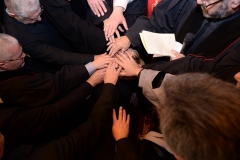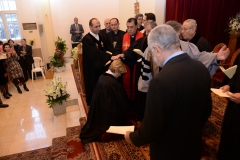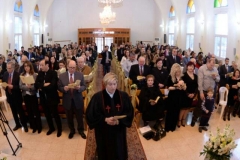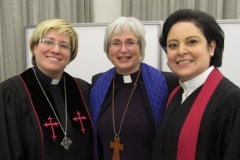A letter from Rev. Elmarie Parker, Regional Liaison for Iraq, Syria and Lebanon
March 2017
Write to Scott Parker
Write to Elmarie Parker
Individuals: Give online to E200504 for Scott and Elmarie Parker’s sending and support
Congregations: Give to D507569 for Scott and Elmarie Parker’s sending and support
Churches are asked to send donations through your congregation’s normal receiving site (this is usually your presbytery)
“History in the Making”
By Rev. Elmarie Parker
“Christ gave some as apostles, and some as prophets, and some as evangelists, and some as pastors and teachers…” — Ephesians 4:11
Something very special and historic happened on February 26, 2017, in Lebanon. In the midst of so many disturbing news reports coming out of the region, I had the privilege of participating in perhaps one of the most positive events in the Middle East thus far in 2017!
In the Presbyterian Church in Tripoli, the National Evangelical (Presbyterian) Synod of Syria and Lebanon (NESSL) ordained the first Arab woman pastor to serve as Minister of the Word and Sacrament.
The Rev. Rola Sleiman was born and raised in the Tripoli Presbyterian Church. She graduated from the Evangelical School in Tripoli when it was still located in the old quarter of Tripoli just down the street from the church. This is a school well known and loved by the city’s Muslim and Christian residents. Many of its Muslim graduates have gone on to serve as moderate political leaders, taking the lessons they learned in school about peaceful and respectful co-existence and seeking to embody that in the political landscape of Lebanon.
Even as the city has grown more religiously conservative since the 1960s, with a small portion of the population now holding radicalized views, the church and school continue to have a strong and positive relationship with its Sunni Muslim-majority neighbors—even to the point that when violence was common between two factions several years ago, Muslim neighbors always made sure to check to see if Rev. Sleiman, then serving as Preacher Rola, was okay.
After graduating in 1997 with her Bachelors in Theology degree from the Near East School of Theology (NEST) located in Beirut, Rev. Sleiman moved to the Bakaa Valley in Lebanon to serve as a Christian educator and then in 2001 returned to Tripoli to teach ethics at the Evangelical School and work as a Christian educator at the Presbyterian Church. But in 2007, when the pastor at the time immigrated to the United States, Rola was appointed by the Synod, upon the request of the congregation, as unofficial pastor. She received her preaching license from the Synod in 2008 to make this appointment official and has carried out all the duties of a pastor except for baptism, the Lord’s Supper, and marrying people. Now, ordained to the Word and Sacrament, Rev. Sleiman is able to carry out the full duties and responsibilities of a pastor and is well received among her colleagues—both Christian and moderate Muslim. She is continuing her work towards completing her Masters of Divinity degree.
“This has been a long and slow conversation,” shared Rev. Sleiman, “and this is good, because everyone has come to see over the years that this gentle way of opening up a new practice has made for a more peaceful acceptance.”
Rev. Joseph Kassab, General Secretary for the NESSL confirmed this and added: “There have been many people and influences that have helped us arrive today to this place of justice and love.”
Certainly, the work of early women Presbyterian missionaries like Mrs. Sarah Smith, committed to educating girls and women, laid the foundation. Fellow Protestants from the Church of God ordained three women as pastors in the early 1920s, and, during the same period, the NESSL elected its first woman to serve as a representative to its General Assembly. And though the door again closed to women in “official leadership positions” for several decades after this, many in the Synod continued to advocate for and positively include women in the life and ministry of the church.
In 1960, a Women’s Alliance was formed, with by-laws that were affirmed by the Synod. This Alliance drew together Christian Protestant women from Iraq, Bahrain, Kuwait, Oman, Syria, and Lebanon. The Presbyterian Church (U.S.A.) helped fund their work, as full-time Arab women staff from the region led the way in supporting and encouraging the work of Arab women in the church across the Middle East.
Rev. Dr. Salim Sahyouni’s example in the 1970s of participating in missionary Elsa Far’s ordination in the United States and then asking her to serve as an assistant pastor in the Beirut Presbyterian Church also contributed to opening the way for ordaining women in the NESSL.
The next big step came in the late 1980s. At that time, Mrs. Najla Kassab from Lebanon was finishing her BA in Christian Education at NEST and felt called to continue her theology studies. And, even though new faculty to NEST in the mid-1980s, like Dr. George Sabra and Dr. Mary Mikhael (who would become NEST’s first female President in 1994), were teaching the biblical and theological basis supporting women’s ordination, it wasn’t yet possible for women to enter NEST’s Masters of Divinity program. So, receiving a scholarship from Princeton Seminary, Najla studied in New Jersey, graduating with her M.Div. in 1990. Her husband, the Rev. Joseph Kassab from Syria, also studied at Princeton.
When the Kassabs returned to Lebanon, they began working in Christian education at the Synod level. Through workshops and conferences, they gently encouraged the ministry work of women and built on the theological training happening at NEST in regards to women’s ordination. After they had led Christian education programs for women and children, the question arose: In what capacity is Najla working—as an employee of the Synod or as a pastor of the Synod? If she is an employee of the Synod, if she were offered a position somewhere else she could possibly say yes. If she is a pastor of the Synod, then her commitment would clearly be to the Synod and the Synod’s commitment would be to her. So, in 1993, the Synod’s Executive Committee and Administrative Council formed a committee to work with Najla in preparation for receiving a preaching license—the first offered to a woman. Najla joyfully accepted this license and has faithfully worked with the women and children of the Synod for the past 24 years. Joyfully, on March 24, 2017, Najla became the second woman to be ordained to full pastoral service in the National Evangelical Synod of Syria and Lebanon.
“Women have proven themselves faithful women of God in the Synod. We have done a lot of grassroots level work over time. We have had four women licensed as preachers since 1993, and now two of us are ordained. This is setting the track for the future not just here in Lebanon, but we pray in the region as well,” Najla shared with great excitement. Protestant Church representatives from Jordan and Egypt attended her ordination, anticipating that day when their church bodies would ordain women in their respective churches, and confirmed their excitement and hope.
Dr. Mary Mikhael, who retired from her service as NEST President in 2011 and currently serves as Communicator for the NESSL to partners in Europe and the United States regarding the Synod’s relief work with internally displaced Syrians and Syrian refugees in Lebanon commented: “It was high time that the church take this prophetic step…. Whenever God calls someone to service, who has the right to say you cannot obey God? This is a happy day for the church to finally take this prophetic step that it should have taken many years ago.”
Scott and I remain so very grateful to be serving alongside of our Presbyterian and other Christian partners here in Lebanon, Syria, and Iraq. To share in these historic moments is a special joy!
We are thrilled to be renewing our service for a second, four-year term beginning July 1, 2017. Thank you for partnering with us through prayer, visits, email, Skype, creative ministry/mission engagement and financial support these past three-plus years. We invite you to continue your partnership with us during our next four-year term. And though we won’t be able to visit with all of you while we are in the States this coming June-September, we are looking forward to seeing as many of you as possible. Thank you for your invitations to visit and share the work of our partners. We will continue our planning work with you this April and May!
In Joyful Partnership in Christ’s Service Together,
Elmarie and Scott Parker
![]() You may freely reuse and distribute this article in its entirety for non-commercial purposes in any medium. Please include author attribution, photography credits, and a link to the original article. This work is licensed under a Creative Commons Attribution-NonCommercial-NoDeratives 4.0 International License.
You may freely reuse and distribute this article in its entirety for non-commercial purposes in any medium. Please include author attribution, photography credits, and a link to the original article. This work is licensed under a Creative Commons Attribution-NonCommercial-NoDeratives 4.0 International License.



